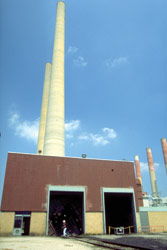A lawsuit with significant implications for environmental health will be heard in Asheville beginning Monday, July 14. The U.S. District Court will consider a case brought against the Tennessee Valley Authority by North Carolina Attorney General Roy Cooper.

The lawsuit demands that the TVA, the nation’s largest public utility, clean up pollution from its power plants because of its adverse effects on North Carolina’s air quality.
Filed in January of 2006, the lawsuit charges that air pollution drifting into N.C. from the agency’s smokestacks constitutes a “public nuisance,” charging that “TVA’s pollutants harm human health, safety, comfort, the environment, and the economy … in North Carolina. TVA’s pollutants also contribute to loss of revenue for the State … as well as increased costs to the citizens of the state from increased hospital visits and other medical costs and absence from work.” According to a fact sheet provided by the attorney general’s office, out-of-state power-plant emissions are responsible for an estimated 15,000 illnesses in North Carolina each year.
The trial will be heard by U.S. District Judge Lacy Thornburg, who previously ruled against TVA’s 2006 claim that North Carolina did not have legal standing to sue the agency over its pollution. TVA appealed this decision in December of that year, but in January 2008, the 4th U.S. Circuit Court of Appeals ruled in favor of North Carolina, clearing the way for the trial to proceed.
Reducing upwind sources of air pollution is a key component of the push to improve North Carolina’s air quality, said Deborah Bryan of the American Lung Association of North Carolina. The group has backed the state’s case against the TVA.
“Particulate matter from coal-fired power plants causes an estimated 1,800 premature deaths each year in our state, and ozone triggers an estimated 240,000 asthma attacks every summer in North Carolina alone,” said Bryan, who works in Raleigh and had a hand in getting the Clean Smokestacks Act, North Carolina’s strict ozone legislation, passed several years ago.
“What we’ve done is clean up the air in North Carolina. But because air is not stationary, we get drifts from Tennessee. This is a big burden, and North Carolina can only clean up what’s within our borders—we can’t control what drifts in from other states.”
TVA, meanwhile, has argued that it’s spent billions to reduce emissions and that pollution produced by North Carolina’s own coal-fired plants poses an even more significant threat to the state’s air quality.
Experts from the WNC Regional Air Quality Agency and the state Division of Air Quality declined to comment on a pending legal matter. Cooper, meanwhile, kept his official statement short and sweet: “We look forward to getting the opportunity to present our case in court,” he said, “so that we can have cleaner air and clearer skies.”
To view a copy of the lawsuit, visit www.mountainx.com/xpressfiles.



Before you comment
The comments section is here to provide a platform for civil dialogue on the issues we face together as a local community. Xpress is committed to offering this platform for all voices, but when the tone of the discussion gets nasty or strays off topic, we believe many people choose not to participate. Xpress editors are determined to moderate comments to ensure a constructive interchange is maintained. All comments judged not to be in keeping with the spirit of civil discourse will be removed and repeat violators will be banned. See here for our terms of service. Thank you for being part of this effort to promote respectful discussion.